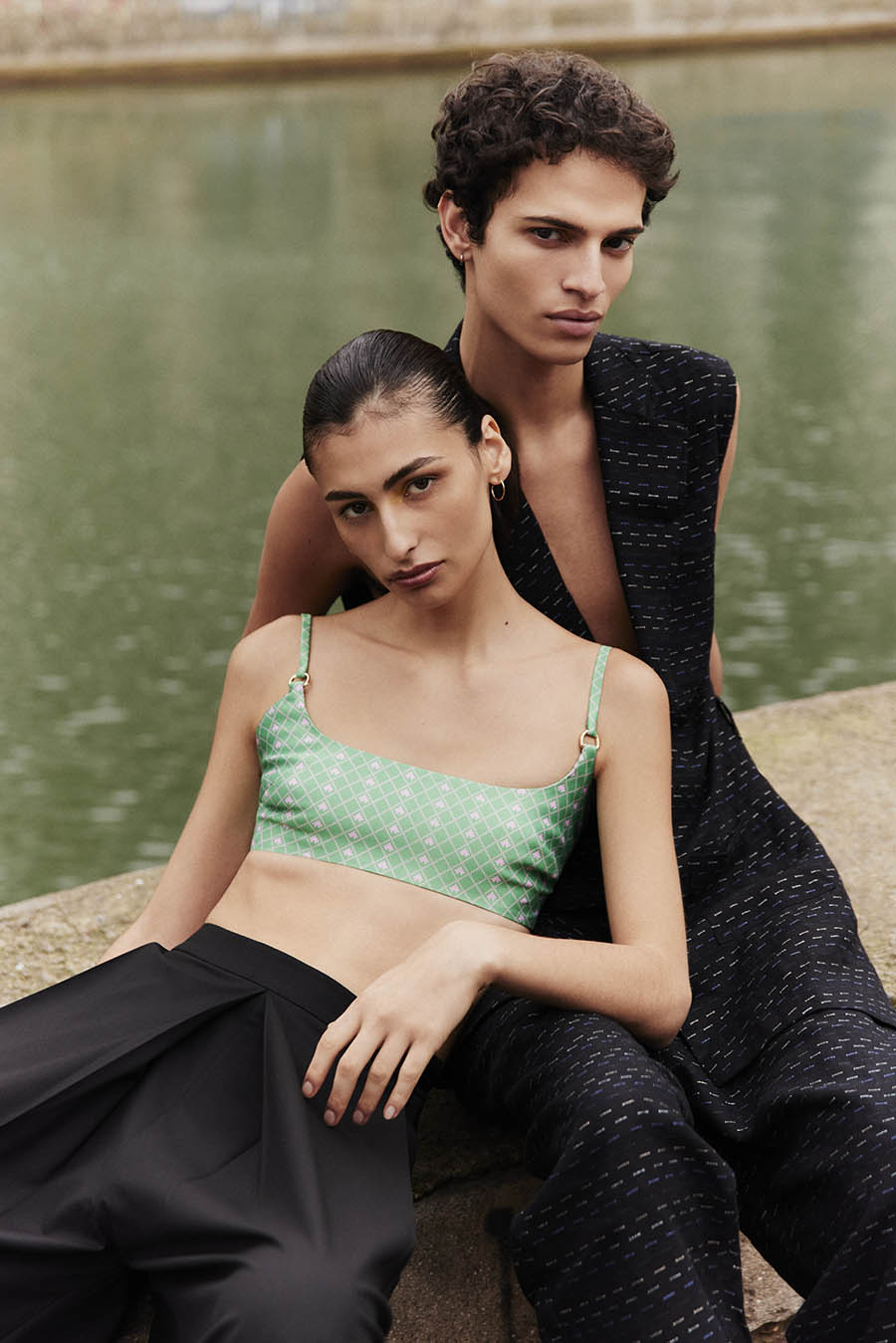The Silk Road Paris
Connecting Fashion Between the East and the West


The Silk Road Paris (hereinafter referred to as TSR Paris) is the first online marketplace in Europe dedicated to highlight South Asian and sustainable fashion designer. It was founded by two native Indians, Yamini and Soumil, who live and work in Paris. They gathered 5 brands (Bhavya Ramesh, Bodice, Jatin Malik, Kissa-goi, Papa Don’t Preach) from India on the platform, using their experience and knowledge in the European fashion industry to help them establishing a business in Europe. Today, CAP 74024 has the chance to speak to them on their journey to the creation of the platform, their perspective on sustainability and ethical design, as well as their ambition on bridging the Eastern fashion to the Western market.
So, what are the ideas behind the foundation of TSR Paris? Why do you guys want to integrate the resources and make this platform exclusive for the Southern Asian designers?
Soumil: Well, we started the plan around a year ago, we wanted to bring all the South Asian designers to mainland Europe because right now the fashion scene is not very diverse in South Asia, we don’t have a platform that that can emphasize the versatility of the designers that we have in South Asia. Hence, we wanted to promote them here in Europe since the cultural diversity is already existed in European society. Also, we wanted to change the outlook of how world sees South Asia. Right now, they see us more as manufacturers than designers. But in fact, South Asia has the ability and the intellect to create something that can be mixed of culture and be considered as design. So, we wanted to bring all the designers that we have in South Asia and promote the sustainable practices they do. At this point, it’s very important that the West is looking towards the East as a market perspective and also, it’s important for the Eastern designers to look towards the West to approach the designs and business opportunity. We wanted to create a platform that can give them this kind of boost and we can have a dialogue between East and West.
Normally, when people talk about the Silk Road, India and South Asian continent rarely come in their mind in the first place. Are you afraid that the naming of the platform might be a bit confusing?
Soumil: We are aware of that, but we want to focus more the ideology of Silk Road, which is the trade of goods between the East and the West in the past and use it as a reference of cultural exchange. Together, we create a modern Silk Road that bridge the fashion, design, are and culture between the two continents.
Over the past years, we’ve seen more and more Indian models walked down the runway, and aspiring Indian designers showcased their design in the fashion capitals. India is also forecasted to be the next big luxury market to grow in the next ten years. Do you think it will bring a positive impact to the current Indian fashion and luxury market?
Yamini: Yes. It’s nice to see Indian models and designers are coming forward and gain more visibility worldwide. But I still feel there are some diversities lacking in terms of design. We feel that there should be more Indian designers in the fashion industry. By creating this platform, we also want to show the world that South Asian designers does not only design Saris, they have all practices which have been used by other designers and we wanted to promote those techniques and culture in a global scale.
Soumil: Also, I think there is a possibility for Indian or South Asian designers to learn from the European market, which is already very mature. Right now, we don’t have this system back in India or other South Asian countries. Our main work is B2B in South Asia and B2C in Europe, so if we can have a platform like TSR Paris, we can share the knowledge we’ve learned in Europe and bring it back to South Asia.


Brands with strong cultural references could attract a specific group of clients, and might also be a hit when ethnic vibe is on trend. But as trends are often seasonal, the fever for them might die out soon. Do you think it will be a potential hamper hindering the growth of the platform?
Soumil: If you look at our platform, you can see that we are going towards the European audiences. We have a perspective of promoting diversity, but also, we want to relate to the people we are selling to. No matter what kind of viral trends are going on now, there’s always a general trend in the fashion industry. If those seasonal trends can mold themselves into the generalized trend, it can definitely last longer. To have those trends that actually become the core identity that people can relate is very important. The brands we represent have their core values and identities that can transcend culture. So, I don’t think the die out of a trend could be a hamper for the growth of our platform.
Yamini: Here in Europe, you have clear distinctions between the four seasons. Off-season excess inventory is an issue for major fashion brands, and it’s actually not very sustainable. In India, you don’t have seasons. Designers are creating garments that can last longer. They don’t want to carry extra inventory, and only create made-to-order or custom order. This is something so great and so major that we would like to promote. I believe that we have to learn from each other, and that’s why TSR Paris is going to be that bridge to convey this information.
Do you think the aesthetics, the strong visual and the distinctive cultural identities of these emerging Southern Asian brands on TSR Paris will be well-received by the mainstream fashion world in Europe?
Yamini: Yes, I we definitely feel that. I think that this is a very long-needed platform. The South Asian fashion platforms are very well-conveyed in the US, in Australia even in the UK, and I think it’s about time for Europe to have one too. Also, unlike any other South Asian fashion platforms, we are not selling saris or traditional garments but designer’s clothes. We really think that this platform is high-needed. The website is performing well and the feedback we received are positive. We started here in Paris, but the whole goal of TSR Paris is to take our culture to every part of Europe and then later to the UK, the Us, and so on. The goal of this global platform is like the Silk Road, connecting East and West. For now, we are taking South Asian designers to Europe, but our ultimate goal is to bring back nice European brands which are not well known in South Asia and introduce them to the market there.
How do you choose the brands on the TSR Paris?
Yamini: I started my career in Paris, so I literally have 0 connection back in India. I went to India last August and we got to meet some designers by contacting them on their Instagram. We proposed them our ideas and they were interested in entering the European market. That was how we get Papa Don’t Preach and Bodice, and the rest was just by the word of mouth.
Soumil: Our core values lie in the sustainability. I know it’s hard to define sustainability in fashion nowadays, but we are going towards to those ethical brands that believe in gender equality and pay fair wage. It’s community-driven, and that’s how we select our brands.
Yamini: Just as a supplementary note, the brands we have a lot of sustainable practices. Our brand Bodice use their old fabrics to create new garments; Kissa-goi has everything made by hand and use recycled cottons. Bhavya Ramesh is using only recycled silver to create her jewelry. Her jewelry is a bit imperfect, but this imperfection is environmental-friendly. In TSR Paris, you can buy from designers who are practicing such good ethics and help supporting local communities back in South Asia.
It seems like all of the five brands that you are representing currently are all from India. Do you plan to expand the roster to designers from other neighboring South Asian countries?
Soumil: Yeah, we are in contact with brands in different parts of South Asia like Sri Lanka, Bangladesh and Pakistan. India was an easy start for us since both Yamini and I are from India. Even in India, we struggled a bit in the beginning. Now we have the trust from the Indian designers, it would be much easier to scout brands in other parts of South Asia. It is also important to understand that for us, the platform is more than a fashion exchange. We don’t want to focus only on fashion designers, we want TSR Paris to represent the culture itself. We are seeking collaboration with different restaurants or artists from different South Asian countries in order to create a community value.
Yamini: We will have a pop-up event from June 7th to 11th of June, where we will be collaborating with a Sri Lankan restaurant for catering and also with artists. I work in fashion, and Soumil is an artist. We have lovely books, amazing artists, fascinating culture and excellent designers there. We want to bring them to Paris and introduce them as a creative community.


How would you describe the Indian and South Asian design? What are the keywords that come into your mind when you describe them to your European clients?
Yamini: For me, Indian and South Asian design are very detailed-oriented and time-consuming. Designers are exchanging time for the perfect piece. Every embroidery is stitch by hands, and every pleat takes hours to create. Also, the ancient weaving techniques is an essence in the Indian and South Asian design, and that can all be found in our designer’s fashion pieces.
Soumil: If you want to encapsulate it in 3 to 4 words, that would be color, culture, detail and intricacy.
Since both of you have worked in the fashion industry in Europe, how do you use your past experiences to help the brands on TSR Paris to raise their visibility in Europe?
Soumil: By living and working here in Paris for 8 years (and Yamini 7 years), we’ve been enrolled in fashion industry from the ground up. We know the people here and we can definitely help these brands to gain visibility. These brands might have some visibilities already in some English-speaking countries, but they are still unknown to the mainland European countries. It is due to the language and cultural barriers, and we are the bridge that cross through these barriers.
Yamini: I worked with some brands we represent on their pricing, consulting, communication and so on. Their look can also be worn by European influencers and celebrities, this will definitely help them gain more visibility.
Visit tsrparis.com for more information on the sustainable fashion brands TSR Paris represents.
Interview by Yves Tsou.